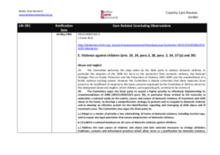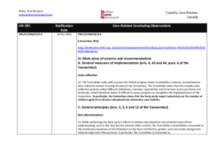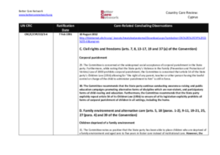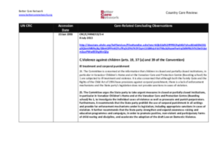Displaying 361 - 370 of 660
This country care review includes the care-related Concluding Observations adopted by the Committee on the Rights of the Child during the seventy-fifth session (15 May 2017 - 2 Jun 2017) of the Convention on the Rights of the Child.
Drawing on data from the Wales Adoption Study, this paper examines the prevalence and profiles of care leavers amongst birth parents whose children were placed for adoption.
This country care review includes the care-related Concluding Observations adopted by the Committee on the Rights of Persons with Disabilities and the Committee on the Rights of the Child as part of their examinations of the periodic reports of Jordan.
This country care review includes the care-related Concluding Observations adopted by the Committee on the Rights of Persons with Disabilities during the seventeenth session (20 Mar 2017 – 12 Apr 2017) of the Convention on the Rights of Persons with Disabilities.
This country care review includes the care-related Concluding Observations adopted by the Committee on the Rights of Persons with Disabilities during the seventeenth session (20 March 2017 - 12 April 2017) of the Convention on the Rights of Persons with Disabilities.
This country care review includes the care-related Concluding Observations adopted by the Committee on the Rights of Persons with Disabilities during the seventeenth session (20 March 2017 - 12 April 2017) of the Convention on the Rights of Persons with Disabilities.
This country care review includes the care-related Concluding Observations adopted by the Committee on the Rights of Persons with Disabilities during the seventeenth session (20 March 2017 - 12 April 2017) of the Convention on the Rights of Persons with Disabilities.
This paper analyzes empirical differences in adoption services of public and private agencies in the United States.
This study explored the experiences of adoptive parents who chose to place their intercountry adopted child in out-of-home care due to the child's disability.
This study seeks to contribute to the literature on child welfare and parental drug use in the United States by answering several research questions.






